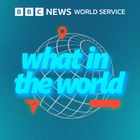
What in the World
Jun 17, 2024
Nuclear power counts for just ten percent of the world’s total power supply and only 33 countries currently have nuclear power stations. But those numbers could soon change as China rushes to build new nuclear facilities and as African countries consider building their own.
Jordan Dunbar from the BBC podcast The Climate Question explains how nuclear power works, describes its benefits and drawbacks, and assesses whether it could ever be seen as a green form of energy.
Many people are nervous about leveraging nuclear power, partly because of the infamous disasters at nuclear sites like Three Mile Island and Fukushima. Alex from the What in the World team runs us through what happened at the Chernobyl nuclear power plant in Ukraine in 1986.
South Africa is the only country in Africa with a nuclear power plant — the Koeberg Nuclear Power Station near Cape Town. But ten other African countries — including Nigeria and Uganda— are looking into getting a plant of their own. Kevyah from the What in the World team explains why some African nations are considering a nuclear future.
Instagram: @bbcwhatintheworld WhatsApp: +44 0330 12 33 22 6 Email: [email protected] Presenter: William Lee Adams Producer: Alex Rhodes and Kevyah Cardoso Editor: Emily Horler

